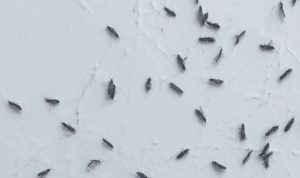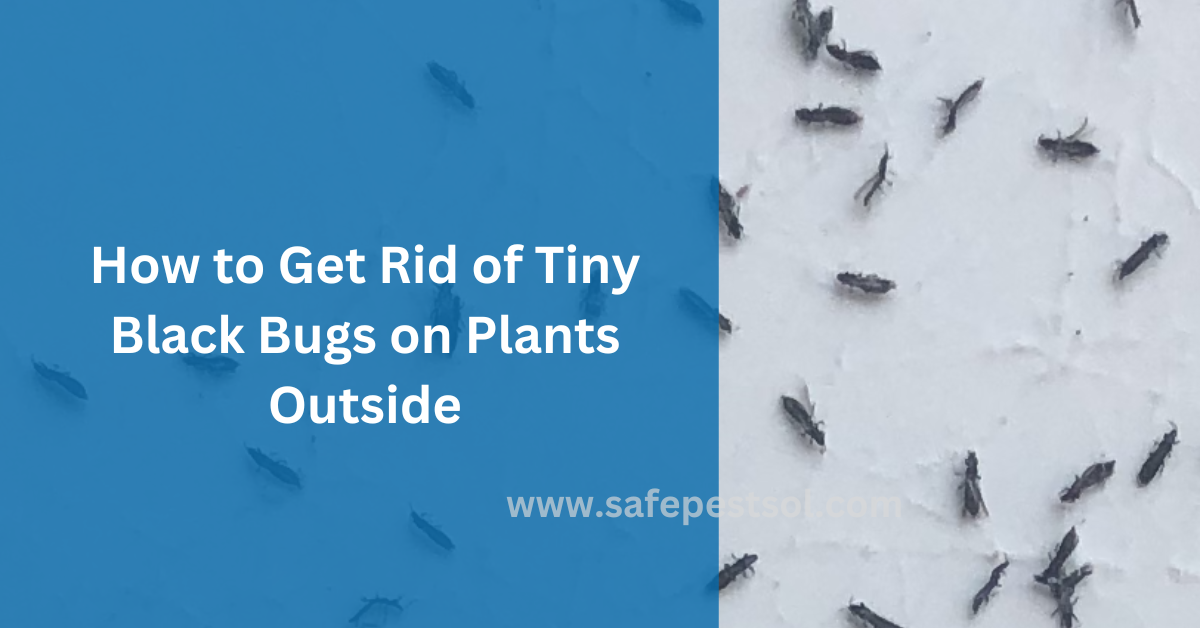How to Get Rid of Tiny Black Bugs on Plants Outside
Tiny black bugs on your outdoor plants are a nightmare for every plant lover. These small creatures usually belong to the black aphid category and suck sap from plants, which hinders plant growth, causing plant damage.
If unchecked, they multiply rapidly and cause massive damage. It is best to catch them early if you notice them on your plant leaves. The longer they stay, the more difficult they are to remove.
Let’s learn about what these bugs are, their life cycle, and the best methods to control them.

What Are Black Aphids?
Black aphids (Aphis fable) are little black creatures having a size of approximately ⅛ inch. These pests stick to the leaves of the plants, shucking whatever sap they can. After this, they leave a honey-like residue behind that attracts mold, making the leaves look dirty and unhealthy.
These pests are usually found on crops like beans, poppy seeds, celery, and viburnum plants. Since they can reproduce without a mate, they are even more dangerous for plants. One black aphid can give birth to multiple offspring, which are already pregnant.
Understanding the Life Cycle of Black Aphids
Black aphids follow seasons in their life cycle:
- Winter: The eggs survive on outdoor plants such as viburnum and burning bushes when spring comes.
- Spring: The eggs hatch into wingless females, which begin feeding and reproducing on the same plant for several generations.
- Summer: Some of the aphids grow wings and migrate to other plants, including crops and garden plants. This causes an increase in population.
- Fall: Winged males and females return to their winter hosts, where females lay eggs to produce the next season’s infestation.
How to Identify Black Bugs on Plants?
Tiny black bugs on plants can be aphids, fungus gnats, trips, flea beetles, or spider mites. Check for sticky honeydew, curling leaves, yellow spots on leaves, or small holes in leaves.
Aphids are found mostly on the stems, while Thrips are found in silvery streaks. Fungus gnats hover over the soil, flea beetles create shot-hole patterns on the leaves, and spider mites spin a fine webbing under the leaves.
Use a magnifying glass to know about their size, shape, and movement. Pest identification is vital for deciding on the best treatment, be it natural predators, insecticidal soap, or neem oil.
Do Black Bugs Affect All Types of Plants?
Black bugs can infest a variety of plants, but some suffer more than others. Indoor, convenient plants like pathos, spider plants, or ferns usually attract fungus gnats due to moist soil. Most of such bugs attack vegetable crops including tomatoes, peppers, and leafy greens. Flowering plants such as roses and hibiscus might suffer damage inflicted by Thrips and black beetles.
Ways to Get Rid of Tiny Black Bugs on Plants Outside
1. Keep Plants Healthy
A strong plant is less likely to suffer from infestations. Give your plants enough water, sunlight, and nutrients to help them resist pests. Weak plants attract black bugs, spider mites, and scale insects, making them more vulnerable to significant damage.
2. Use a DIY Soap Spray
A simple dish of soap and water is a great solution to control black aphids. Mix a few drops of insecticidal soap in a spray bottle filled with water and spray it on the affected plant leaves. This solution disrupts their grip and suffocates them. Repeat this every few days until the black insects are gone.
3. Try Oil Sprays
Neem oil and other essential oils are excellent natural remedies. These oils coat the black bugs, suffocating them while preventing further infestations. Apply neem oil in the early morning or late evening to avoid burning the plant tissue.
4. Regular Pruning and Cleaning
Trim infested leaves and remove any sticky substance left by black aphids. Also, clean up fallen leaves and debris, as these can be hiding spots for soil mites, fungus gnats, and black thrips. Keeping your garden tidy helps prevent infestations.
5. Use Plants with Bug-Resistant Qualities
Some plants naturally repel black insects. One such example is marigolds. This bright flower emits a smell that drives away flea beetles, aphids, and other pests. Planting marigolds around your garden can help protect your other plants.
6. Introduce Natural Predators
Certain beneficial insects help control black aphids by feeding on them. These include:
- Ladybugs: These colorful beetles eat aphids and other tiny bugs that harm plants.
- Green lacewings: Their larvae consume a large number of black aphids.
- Hoverflies: These insects look like bees but are excellent at controlling black bugs.
- Parasitic wasps: These wasps lay eggs inside black aphids, reducing their population naturally.
Natural Predators of Tiny Black Bugs
Nature has its own way of dealing with bed bugs, black aphids and other pests. Some insects actively feed on these bugs, keeping their numbers in check.
- Lady beetles: Both adults and larvae feast on black aphids.
- Minute pirate bugs: These are Tiny black and white bugs that prey on aphids.
- Aphid midge: Bright orange larvae inject toxins into black aphids, killing them.
- Brown lacewings: Found mostly on trees, they are excellent at controlling black bugs.
- Parasitic wasps: These wasps lay their eggs inside aphids, eventually killing them.
Encouraging these beneficial insects in your garden helps maintain a natural balance, preventing large-scale infestations.
Conclusion
If you have tiny black bugs on your outdoor plants, don’t ignore them. Black aphids and other black insects multiply fast and can cause significant damage to your garden. Keeping your plants healthy, using natural remedies like neem oil and dish soap, and introducing natural predators are effective ways to control them. With the right approach, you can protect your plants and enjoy a thriving garden.
FAQs
Are black aphids harmful to humans?
No, black aphids do not bite humans, but they can cause plant damage by sucking out plant sap. Their sticky substance (honeydew) can lead to mold growth, affecting the health of outdoor plants.
How do I prevent black bugs from coming back?
Keep your plants strong with proper care, use preventive measures like neem oil and insecticidal soap, and introduce beneficial insects to keep pest populations low.
What is the best way to remove black aphids quickly?
A combination of DIY soap spray, oil sprays, and natural predators works best. Regular pruning and maintaining a clean garden also help prevent future infestations.
Get professional help!
If there are black bugs in your plants, it is the beginning of your plan of destruction. To avoid this, seek help from professionals right now. Contact Safe Pest Sol and let our expert pest control services guide you.

